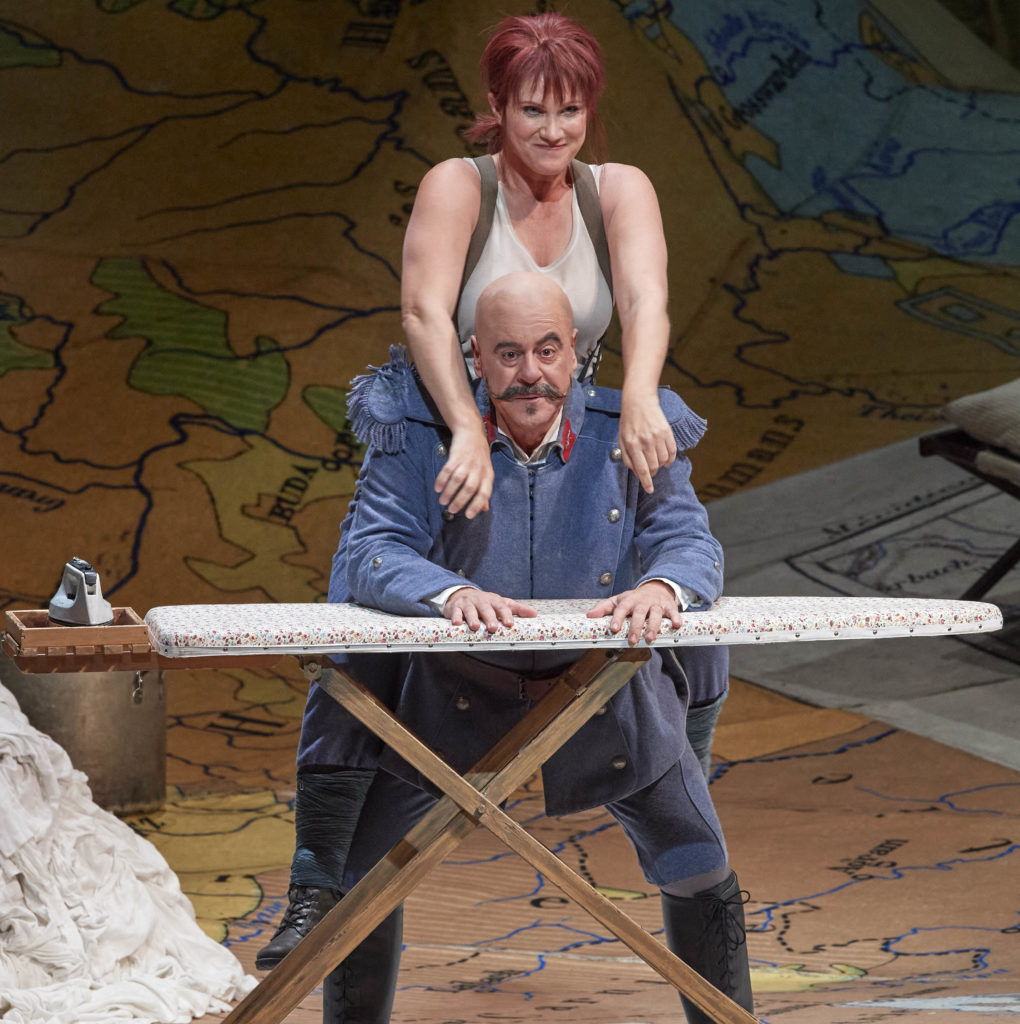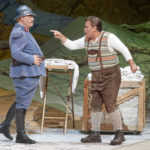 The opening scene is a grungy ‘Les Miserables’ set – carts, piled-up junk furniture; women refugees praying to the Virgin, their men armed, (in Laurent Pelly’s long-running Vienna State Opera production.) The Madame Marquise of Berkenfield (Donna Ellen) is outraged: surprised by the enemy, the advancing French army. Ellen, in her eccentric, stylish hat and fur coat, escapes, haughtily pushing through the rabble. The canons hold nothing sacred: the French are a bunch of …(The soldiers parody her.) She’s hot, cold, feels dead . It’s all her steward Hortendius’ (Marcus Pelz) fault: the last of the Berkenfields, all in danger of being pillaged. She’s frightened, for a lady of her standing, une femme de mon nom.
The opening scene is a grungy ‘Les Miserables’ set – carts, piled-up junk furniture; women refugees praying to the Virgin, their men armed, (in Laurent Pelly’s long-running Vienna State Opera production.) The Madame Marquise of Berkenfield (Donna Ellen) is outraged: surprised by the enemy, the advancing French army. Ellen, in her eccentric, stylish hat and fur coat, escapes, haughtily pushing through the rabble. The canons hold nothing sacred: the French are a bunch of …(The soldiers parody her.) She’s hot, cold, feels dead . It’s all her steward Hortendius’ (Marcus Pelz) fault: the last of the Berkenfields, all in danger of being pillaged. She’s frightened, for a lady of her standing, une femme de mon nom.
Seargent Sulpice, Carlos Alvarez’s marvellous baritone, authoritative in the role he’s made his own – ‘There she is, Marie! How pretty; for the regiment to have such a daughter. But Jane Archibald, red-haired, short-cropped, with a pony tail, in her dungarees and white tee-shirt, brings out her huge washing basket and ironing board. She sings (Archibald’s stunning coloratura range perfect for Donizetti), how she badly misses going into battle: the cry of La Patrie and Victoire on her lips. The stage (Chantal Thomas) is now an unfolded map presumably of the Tyrol: a battle front. She was born to the sound of war, Au bruit de la guerre; loves the roll of the drums (Donizetti’s recurring ‘anapaest’ rhythm.) And who cheers them up on camp evenings: she’s their mess-girl, the regiment’s a father to her.
The lines of washing, men’s underwear, long-johns, seem to have shrunk to child’s sizes. Anyway, Sulpice, grown fond of Marie, chides her for seeing a Tyrolean, (who turns out to be her lover). Yes, she admits to talking; he saved her life picking flowers on a cliff!
 The soldiers have caught a Tyrolean partisan. The chorus of C’est un traitre, qu’il périsse‘ anticipates later Verdi, irresistibly rhythmic. Would they execute a man who saved her life? Javier Camarena, stocky, in Tyrolean gear, ‘fairisle’ sleeveless, braces and culottes, has electrifying charisma. Jamais. He toasts France and his new friends.
The soldiers have caught a Tyrolean partisan. The chorus of C’est un traitre, qu’il périsse‘ anticipates later Verdi, irresistibly rhythmic. Would they execute a man who saved her life? Javier Camarena, stocky, in Tyrolean gear, ‘fairisle’ sleeveless, braces and culottes, has electrifying charisma. Jamais. He toasts France and his new friends.
Now Archibald, a natural in the role, like a butch nightingale, sings a paean to the Regiment, it’s record unequalled, the Glorious 21st, (Le Beau vingt-et-unième.) Glorious Archibald. Enthusiastically applauded. (It’s a shame the House was only three-quarters full due to a spike in Covid.) Then the soldiers drill, rifles pointing at the audience: but it’s all in good fun! The washing line collapses, Camarena is whisked away to enrol.
We see Archibald/Marie bring out a regiment’s supply of potatoes to peel. Camarena has escaped his ‘captors’ and returned to Marie. Do you love me (Quoi vous m’aimez?). She’ll judge for herself. His beautiful country, he’ll gladly give up it for her. Marie and Tonio’s duet Depuis l’instant is moving, emotional against the spritely comedy. She used to love war… Now Tonio. Camarena’s not, physically, the ideal romantic hero. But with that fabulous tenor- elegant tone, brilliant highs, unblemished coloratura- he’s unstoppable. There’s no resistance!
The Marquise Berkenfield -another of Donizetti’s uniquely individual characters – approaches across the map covering the stage. Sulpice accompanying her, recognises the name Berkenfield from the letter found near Marie he’d saved. It seems Berkenfield is her aunt. And she now demands, Give my child back, my…niece. Is the child well brought up? Ellen, in her overbearing Lady Bracknell manner. But Archibald’s Marie, mess-educated, is barely able to read the testimonial Sulpice saved. My aunt? Do I have relatives? Donizetti’s satire on aristocrats’ sexual indiscretions prefigures Wilde, and even Shaw’s Pygmalion. One day she’ll be one of the Berkenfield’s, but she needs instruction in etiquette…
Meanwhile, RATAPLAN, the Chorus sing of the sound of drums. Three cheers for war and terror. (What a send up?) Tonio has signed up as a French soldier. What a happy day under your flag. In Mes amis, Camarena’s gleaming tenor is sensational, (recalling Juan-Diego Florez.) But Tonio, who signed up for Marie, is reminded by the soldiers’ Chorus: her hand is promised to the Regiment. He remonstrates, swears she loves him.- What our Marie?
Camarena’s impassioned, What a fate for my heart was a high spot: Pour mon âme, “an Everest for tenors”, sung by Camarena with devastating high notes. Camarena salutes the audience, who gave him a prolonged standing ovation. (No bravos allowed- Covid restrictions.)
Now Archibald, pulling on a clothes line, in her touching aria Il faut partir, bids adieu to her ‘collective father’ the regiment. Backed by a plaintive solo cor-anglais, Archibald is captivating as she wipes away her tears: farewell to the friends of her childhood. Alvarez’s Sulpice gives her a hug, cradling her head, she the guardian angel of the regiment, .(Very brave in these Covid times.)
Act 2, in the Berkenfield’s castle, is something else; more than a change of scene. The cleaners are polishing the oak floor and panels, a ballet sequence in stylised robotic movements. In walks the formidable, fantastically dressed Duchess of Crakentorp. This is traditionally a walk-on part for celebrities: tonight Maria Happel, actress with Vienna’s Burgtheater, TV star, chanteuse, singing Piaf’s Milord . French Cafe culture infiltrates Staatsoper! But the lyrics – we cry for love all our life, laugh kind sir, sing kind sir – are poignant.
In walks the formidable, fantastically dressed Duchess of Crakentorp. This is traditionally a walk-on part for celebrities: tonight Maria Happel, actress with Vienna’s Burgtheater, TV star, chanteuse, singing Piaf’s Milord . French Cafe culture infiltrates Staatsoper! But the lyrics – we cry for love all our life, laugh kind sir, sing kind sir – are poignant.
Marie’s singing lessons are another highlight, a ‘pastoral’, interrupted by Sulpice’s constant interjections, sabotaging the lesson, coaxing Marie into singing RATAPLAN, the refrain of the Regiment.(Chacun le sait, the glorious 21st). The songs get mixed up, and in the burlesque, the Marquise gets increasingly uptight.
Ellen drags Archibald out by the hair. In vain she’d tried to impress her with the social niceties. To a beautifully articulated cello accompaniment, Marie conceals her sorrow, she’s not into rank or show, Par le rang et par l’opulence -‘a mix of French romance and Italian melody’.
The wedding reception is weird: a room full of ghostly aristocratic stiffs, choreographed doddering puppets. (The life they’re planning for her.) Suddenly the whole Regiment burst in to rescue ‘their Marie’. She, Tonio, Sulpice sing, les trois reunis.
What’s a soldier doing with my daughter? Camarena, in Tonio’s aria, begs for Maria’s hand in marriage- why he engaged as a soldier. Camarena kneels, hand on heart. Ridiculous applause! He’s refused, but reveals Berkenfield isn’t her aunt, but her mother, (Marie, ironically, daughter of a Captain.)
Now Marie knows the family secret, the Marquise has to sanction the marriage. Alvarez’s Sulplice embraces Ellen’s Berkenfield. For real. (Are they regularly tested?)
A vivandiere, daughter of a regiment? Happel’s Duchess’s plans for Marie are scuppered, and she storms out in a huff, making alarming rude noises.
Finally, Marie’s Salut à la France, sung by Archibald with verve, and breathtaking coloratura. A final chorus of Salut, once France’s alternative national anthem. A triumph for Archibald, also Camarena, both debuting here in their parts, but you wouldn’t know from their symbiosis. And idiomatic playing from Vienna State Opera Orchestra and Chorus under Evelino Pido. © PR 20.09.20
Photos: Jane Archibald (Marie), Carlos Alvarez (Sulpice); Javier Camarena (Tonio), Carlos Alvarez; Maria Happel (Duchess of Crakentorp); Featured Image, Jane Archibald, Javier Camarena, Carlos Alvarez
© Wiener Staatsoper / Michael Pöhn
